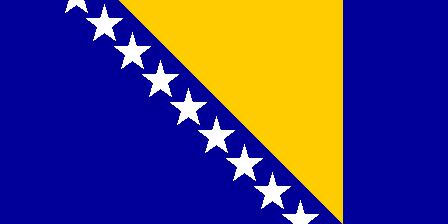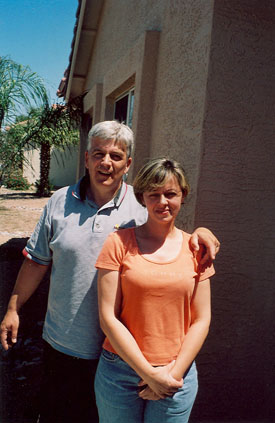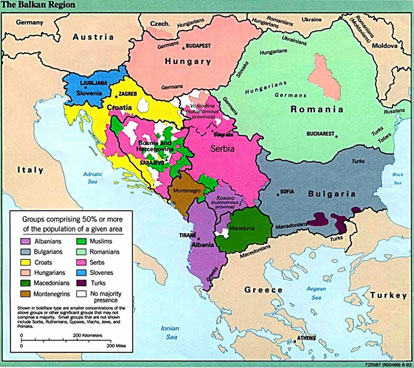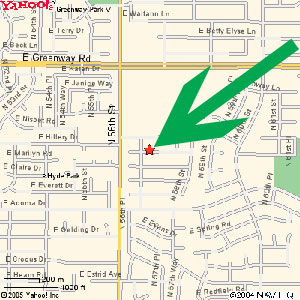
Crossing The Valley

(Map of Bosnia)
"FROM SARAJEVO TO SCOTTSDALE"
What is a refugee? According to the 1951 Convention Relating to the Status of Refugees, a refugee is a person who has fled his or her country "owing to well-founded fear of persecution for reasons of race, religion, nationality, membership of a particular social group or political opinion, and is unable or unwilling to return to that country due to such fear." My interview is with two former refugees from Bosnia. This is the story about Sead and Natasa Maric’s and their voyage from war-torn Bosnia to Phoenix in 1993-94.
“The war started
slowly in late 1992. A sniper shot was heard here and there.
 A few
people were killed every week in our neighborhood. Then bombs
started exploding several times a day. People were dying all around us. We heard stories
about more neighborhoods in Sarajevo experiencing increased violence and deaths. By
early 1993 our country was in total war!
Both Serbia and Croatia wanted to claim parts of Bosnia as their
rightful territory. They both had large armies and Bosnia had nothing.
We did not have an organized army. We fought back with whatever hunting
guns or stolen weapons we could find. I am Muslim and Natasa is Serbian
Orthodox Christian. Serbia and Croatia hated both of us for
religious reasons. As a “mixed” couple we had no one to go to. Both
sides wanted us dead.”
_______________________________________________________________
A few
people were killed every week in our neighborhood. Then bombs
started exploding several times a day. People were dying all around us. We heard stories
about more neighborhoods in Sarajevo experiencing increased violence and deaths. By
early 1993 our country was in total war!
Both Serbia and Croatia wanted to claim parts of Bosnia as their
rightful territory. They both had large armies and Bosnia had nothing.
We did not have an organized army. We fought back with whatever hunting
guns or stolen weapons we could find. I am Muslim and Natasa is Serbian
Orthodox Christian. Serbia and Croatia hated both of us for
religious reasons. As a “mixed” couple we had no one to go to. Both
sides wanted us dead.”
_______________________________________________________________
The War in Bosnia began in late 1992. “Ethnic cleansing” or the systematic raping, murdering, and exiling of those you hate was a commonly heard phrase during this war. Centuries of ethnic, religious, and social conflicts has kept the Balkans in constant turmoil. The causes of the Bosnian War are diverse and complicated – similar to the Israeli-Palestinian conflict. _______________________________________________________________
“By September or October 1993 we had been living in our basement for about seven or eight months. Probably 75% of Bosnia was now under Serbian control. We had a very nice home and lived in a beautiful neighborhood in Sarajevo. I worked in the Internal Affairs Department for the Sarajevo Police Department and Natasa was a homemaker. I have a degree in Political Science and also taught at the university. We had no electricity or running water. Food was constantly in short supply. No medicines were available. Government services were almost non-existant. Hospitals were shut down. Our beautiful city was being bombed day and night. Families were also being destroyed by suicides and divorces. It was very, very hard to survive!”
“At the time our children were very young. Nina, our daughter was nine and Miran was six years old. One day a bomb landed a few feet from my son and did not explode! Can you imagine the fear that we all had? To this day he still has nightmares about this! I remember telling Sead, ‘I don’t know how much longer I can live like this!’ Sometime in the fall Miran developed a lung disease. I could not find a doctor to diagnose and medicines were not available. He kept getting worse and worse. I befriended a Spanish United Nations soldier and asked him to come see Miran. He saw how sick he was and made arrangements for a Spanish military doctor to look at Miran. He told me that my son was going to die soon if he did not receive medical treatment! I decided at that moment that I had to get my children out of Bosnia. Right now! That was in December of 1993.”
“I told Sead that I
was going to take the children to Austria and stay with Mensur, his old
college friend. I could not stay in Bosnia any longer. I was not going
to watch my children die! I met the Spanish doctor and soldier again
and asked for their help.
With only some clothes, photographs, money,
and identification my children and I were loaded onto a Spanish military
tank headed for Croatia. That’s where their military base was located. The
convoy was stopped at the border checkpoint. My tank driver told me
that the border guards search every third tank. I had no idea whether
our tank would be searched! I was very frightened and the children
began to cry. I had to put my hands over their mouths and sing quietly
to them. If we were discovered, we would be shot on sight! God was
watching over us. We made it through the checkpoint and into Croatia. Sead’s cousin worked at the Bosnian Embassy in Zagrab. We stayed with
him for two weeks. He somehow got us fake passports and arranged
for transportation to Austria.”
“We moved in with
Mensur and his wife. My son immediately received medical care and fully
recovered from the lung infections and virus. Mensur allowed us to live
with them until they migrated to the United States in about October. I
worked six days a week cleaning houses. I got around the city on an old
bicycle.
 Meanwhile, Sead abandoned our home and was living with a
friend in Sarajevo. He still worked for the police department. He came
for a week in the summer and reluctantly agreed that we should go to
the United States. Our beautiful city was in ruins and the country was
in bedlam. We no longer had a country or a life in Bosnia. Mensur
helped me with completing documents and I applied for refugee status
with the American Embassy in Vienna. Sead came back to Vienna a few
months later. We successfully passed the interview. As a mixed religion
marriage, we ‘cannot live in Bosnia anymore.’ The interviewer was nice
and agreed to grant us permission to enter the United States. The
International Rescue Committee made all of the arrangements and provided
the airline tickets. We gathered our few belongings and flew to America
November 21, 1994. We stopped in Chicago for Customs Clearance, and
then on to Minneapolis. We finally arrived in Phoenix November 22,
1994! Scared and not knowing the language – but we were free!!
Meanwhile, Sead abandoned our home and was living with a
friend in Sarajevo. He still worked for the police department. He came
for a week in the summer and reluctantly agreed that we should go to
the United States. Our beautiful city was in ruins and the country was
in bedlam. We no longer had a country or a life in Bosnia. Mensur
helped me with completing documents and I applied for refugee status
with the American Embassy in Vienna. Sead came back to Vienna a few
months later. We successfully passed the interview. As a mixed religion
marriage, we ‘cannot live in Bosnia anymore.’ The interviewer was nice
and agreed to grant us permission to enter the United States. The
International Rescue Committee made all of the arrangements and provided
the airline tickets. We gathered our few belongings and flew to America
November 21, 1994. We stopped in Chicago for Customs Clearance, and
then on to Minneapolis. We finally arrived in Phoenix November 22,
1994! Scared and not knowing the language – but we were free!!
“Mensur and his wife arrived in Phoenix a few weeks earlier. He invited us to stay with them for awhile. It would have been very frightening if he had not been in Phoenix. We immediately met with the Catholic Social Services people in Phoenix. They were wonderful. We were given $700 per person to help us with initial costs. They helped us find an apartment and our first jobs. Our first car was $1,200!! It might as well have been $120,000! It broke down within a few weeks and the repair bill was $600.00. Our combined income was only $350.00 a week.”
“My first job was at
a construction company in Phoenix. I new very little English, but my job
required very little communication. I read translation books and Natasa
helped me to learn English. Work was good at that company. I did not
experience any racial prejudice from fellow workers. I got a new job
with a man who owns many McDonalds’ franchises in Phoenix.
I am the head
electrician and air conditioning technician. Fortunately, I learned
these trades in Bosnian high schools. ( In Bosnia, all men learn a trade
in high school before they go to college). The owner is wonderful. He
hosted a party for Natasa and I when we became American citizens in
2000. He treats us like family and I am a very loyal employee.
Natasa’s first job (at age 30) was in Peoria. She was a supervisor for
many Bosnian women who made clothing. She spoke Bosnian all day and
felt like she was not learning how to be an American. She took ESL
classes at Glendale Community College. After three years she came to my
company and is now an administrative assistant and speaks English much
better than I. At least I answer the telephone now. I was
self-conscious about my English.”
“We have a wonderful
life here in America. After four years we got our green cards and we
became U.S. Citizens on July 14, 2000! (pride is in his voice) We have
very good jobs, Nina is attending University of Arizona and Miran plays
basketball at Horizon High School. Our children are happy. Natasa’s
mother and brother are now in Phoenix. My mother, brother, and sister
are still in Bosnia. We send them money every other month. I
communicate by computer and telephone my mother every weekend. Although
there is an organization of Bosnian immigrants in Phoenix, we are too
busy to join. Like most Americans, we are too busy with our families
and jobs and friends to be associated with an organization. But life
here is very good. We are happy here. Would we ever go back to
Bosnia? No. There are no jobs. The Bosnia that I knew and loved no
longer exists. My children are Americans and their life will be here.
We do not want to leave them. Our children are the most important
things to us. Besides, we have changed. America does that to you.
When we first arrived the air we breathed felt different, the food and
people were different. The first two years were very, very difficult. But we
have adjusted and love this country. ”
Like most Americans, we are too busy with our families
and jobs and friends to be associated with an organization. But life
here is very good. We are happy here. Would we ever go back to
Bosnia? No. There are no jobs. The Bosnia that I knew and loved no
longer exists. My children are Americans and their life will be here.
We do not want to leave them. Our children are the most important
things to us. Besides, we have changed. America does that to you.
When we first arrived the air we breathed felt different, the food and
people were different. The first two years were very, very difficult. But we
have adjusted and love this country. ”
“Besides, we are Americans now."